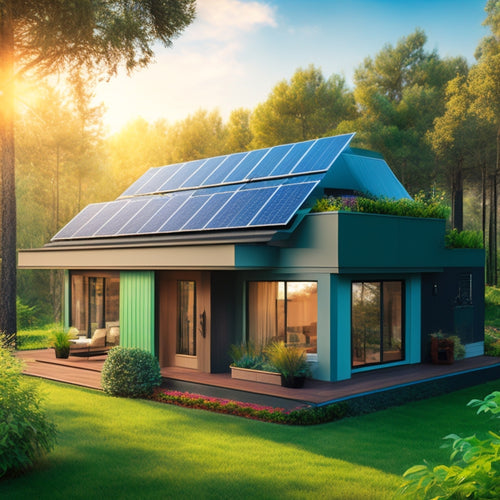
5 Best Home Energy Systems for Sustainable Living
Share
You're considering upgrading to a sustainable home energy system, and you're on the right track! You've got several options to choose from, each with its unique benefits. Smart power strip solutions help you optimize energy usage and reduce waste, while energy monitoring systems provide real-time tracking and data analysis. Solar power installation reduces your reliance on traditional energy sources, and electric vehicle charging systems offer convenient and cost-effective solutions. Whole-home energy management systems integrate solar panels, energy storage, and smart appliances for maximum efficiency. Now, let's take a closer look at each of these systems and examine how they can contribute to your sustainable lifestyle.
Key Takeaways
- Smart power strips optimize energy usage, monitor standby power consumption, and enable real-time tracking for a more sustainable lifestyle.
- Solar power systems reduce reliance on traditional energy sources, convert sunlight into electrical energy, and enhance brand reputation.
- Whole-home energy management integrates solar panels, energy storage, and smart appliances for maximum energy independence and minimized carbon footprint.
- Energy monitoring solutions facilitate understanding of energy usage patterns, provide efficiency tips, and promote informed decision-making about home energy systems.
- Electric vehicle charging systems prioritize charging speed and cost-effectiveness, encouraging efficient and convenient charging solutions for homeowners.
Smart Power Strip Solutions
As you take steps towards sustainable living, one often overlooked aspect is the energy efficiency of your home's devices and appliances.
Integrating solar power into your energy system can greatly reduce your carbon footprint and reliance on the grid Renewable Energy Integration.
Smart power strip solutions can help you optimize energy usage and reduce waste. By installing smart outlets, you can track power consumption in real-time, identifying areas where you can make adjustments.
One of the key smart outlet benefits is the ability to monitor standby power consumption, which can account for up to 10% of your energy bill.
With power consumption tracking, you can pinpoint devices that are using excessive energy and take action to reduce their usage. This level of control gives you the freedom to make informed decisions about your energy usage, helping you achieve a more sustainable lifestyle.
Energy Monitoring Made Easy
You're taking an essential step towards sustainable living by monitoring your home's energy consumption. Understanding your energy usage and consumption patterns is vital to making informed decisions about your home's energy system. With smart meters and real-time tracking, you can identify areas of inefficiency and take action to reduce your energy consumption.
| Benefits | Features |
|---|---|
| Cost Savings | Real-time tracking, Efficiency tips |
| Home Automation | Smart meters, Data analysis |
| Optimized Energy | Consumption pattern analysis, Energy usage monitoring |
Solar Power for Homeowners
By utilizing the power of the sun, homeowners can greatly reduce their reliance on traditional energy sources and lower their carbon footprint. You can achieve this through a solar panel installation, which converts sunlight into electrical energy. This clean energy can power your home, reducing your energy bills and environmental impact.
By achieving energy independence through solar power, you can minimize reliance on the grid and enhance your brand reputation, attracting environmentally conscious customers. To maximize your energy independence, consider pairing your solar panel installation with solar battery storage. This allows you to store excess energy generated during the day for use during the night or on cloudy days.
With solar power, you'll enjoy a significant reduction in your energy costs and a cleaner, more sustainable lifestyle. By making the switch, you'll be taking an essential step towards energy freedom and a healthier planet.
Electric Vehicle Charging Systems
With the increasing adoption of electric vehicles (EVs), homeowners are looking for efficient and convenient ways to charge their cars.
As you consider installing an electric vehicle charging system, you'll want to prioritize charging speed and cost-effectiveness. Many commercial installations are now opting for solar-powered charging solutions to reduce their carbon footprint and energy costs.
Level 2 charging systems, which use a 240-volt charging station, can replenish your EV's battery up to 5 times faster than a standard Level 1 charger. However, they require a dedicated 240-volt circuit, which can increase installation costs.
You'll need to weigh the benefits of faster charging against the added expense. Look for systems with advanced features like Wi-Fi connectivity, scheduling capabilities, and energy usage tracking to optimize your EV charging experience.
Whole-Home Energy Management
Beyond electric vehicle charging, a thorough approach to home energy management is vital for sustainable living. You need a system that optimizes your energy usage, reducing waste and minimizing your carbon footprint.
A whole-home energy management system integrates various components, such as solar panels, energy storage, and smart appliances, to achieve energy efficiency. By leveraging renewable energy sources like solar power renewable energy utilization, you can greatly reduce your reliance on the grid and lower your carbon emissions.
It also enables demand response, allowing you to adjust your energy consumption in real-time based on grid conditions. This level of control and flexibility is essential for maximizing your energy independence.
Frequently Asked Questions
Can I Install Energy-Efficient Systems in an Existing Home?
You're ready to shake off energy-guzzling habits, and that's a brilliant move! Yes, you can install energy-efficient systems in your existing home; start with an energy audit to pinpoint areas for improvement, then tackle insulation upgrades to seal in the savings.
How Do I Choose the Right Energy-Efficient Appliances for My Home?
When selecting energy-efficient appliances, you'll want to check appliance ratings and energy labels, like ENERGY STAR, to guarantee they meet your sustainability goals.
Are Energy-Efficient Systems Compatible With My Current Electrical Grid?
A million questions swirl in your mind, but rest confident, you'll find harmony between your energy-efficient systems and current electrical grid; most systems are designed for seamless grid compatibility, and energy storage solutions guarantee a smooth shift, giving you the freedom to power your home, your way.
Can I Use Renewable Energy Sources in Areas With Frequent Power Outages?
You can rely on solar backup systems and wind turbines to provide electricity during frequent power outages, as they're designed to operate independently of the grid, giving you energy autonomy and freedom from utility dependence.
Do Energy-Efficient Systems Require Frequent Maintenance or Replacement?
You'll be surprised to know that 70% of households experience energy waste due to inefficient systems. When you invest in energy-efficient systems, you'll enjoy long-term savings, but you'll need to stick to regular maintenance schedules to guarantee peak performance and avoid replacement.
Related Posts
-

What Tax Deductions Apply to Sustainable Building Materials?
You can claim various tax deductions for sustainable building materials, thanks to over 40 federal tax incentives sup...
-

3 Green HVAC Filters for Solar-Powered Homes
When outfitting your solar-powered home with an HVAC system, you'll want to choose filters that align with your commi...
-

7 Top HEPA Filters for Green Building Projects
You need a reliable HEPA filter for your green building project that aligns with your sustainable goals and guarantee...


